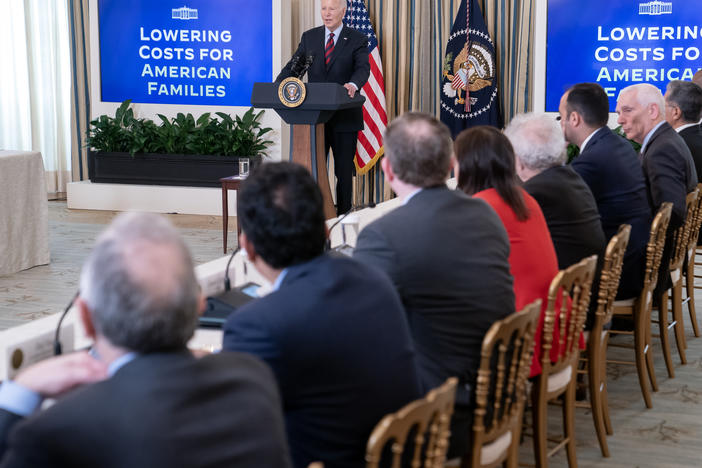Section Branding
Header Content
Outside Ethics Group Says 7 House Lawmakers Didn't Disclose Stock Trades
Primary Content
The complaints from the Campaign Legal Center against four Democrats and three Republicans show a trend — lawmakers failing to disclose transactions required by an insider trading law.
Transcript
AUDIE CORNISH, HOST:
Seven House lawmakers today are facing ethics complaints for violating the STOCK Act, a law that polices insider trading and members of Congress. The push to investigate these members follows a bipartisan trend of lawmakers ignoring disclosure requirements in recent months. The rules were put in place so the public can hold elected leaders accountable if they vote in their own interest over their constituents.
NPR's Deirdre Walsh, who covers Congress, joins us now.
Welcome.
DEIRDRE WALSH, BYLINE: Hi there, Audie.
CORNISH: Who are the members? What are the allegations they're facing?
WALSH: Well, NPR learned today that the Campaign Legal Center, which is a nonpartisan group that promotes transparency in government, filed complaints against these seven. Four are House Democrats - Iowa Congresswoman Cynthia Alksne, New York Congressman Tom Suozzi, Virginia Congressman Bobby Scott and the delegate from Guam, Michael San Nicolas. The three House Republicans are Warren Davidson from Ohio, Lance Gooden from Texas and Roger William, who's also - Roger Williams, who's also from Texas. Five of these members actually sit on the House Financial Services Committee - Alksne, Davidson, Gooden, San Nicolas and Williams.
And in some of these cases, it was just a few trades that they failed to disclose. For example, Congressman Scott didn't disclose four. Congressman Williams didn't disclose three from a spouse. But in Congressman Suozzi's case, it was approximately 300 transactions since 2017 that he did not report, and those represent several millions of dollars in trades. It's the law that members have to file these regular reports on their stock transactions within 45 days. And these members didn't, and that's why the complaints were filed with the Office of Congressional Ethics today.
CORNISH: Not to diminish what's going on, but why is this suddenly such an issue?
WALSH: Well, the law was created to make members accountable so the public would know that they're not profiting from nonpublic information. And this is just part of a trend. It's not the first time this happened. It's impacting members of both parties. I talked to Kedric Payne who's general counsel for the Campaign Legal Center, and he argues these disclosures are really the only way that Congress can enforce the law. Here's Payne.
KEDRIC PAYNE: The closest mechanism that we have is to require those stock trades to be disclosed, and then you can allow the public, watchdogs and even the ethics committees to try to determine whether or not there's a potential correlation with inside information that was received and the timing of those stock trades.
CORNISH: So what are lawmakers now saying about this? I mean, how are they responding to the allegations?
WALSH: So they just learned this afternoon. But Suozzi's spokesman tells NPR that the investments from the congressman were managed through an independent adviser or multiple independent advisers and said going forward, they are going to properly report the regular disclosures on a regular basis. Gooden actually took issue with the complaint. And he called it frivolous and argued his trades fall within the threshold. But in the complaints themselves, they're saying that the ethics committee needs to get involved and needs to police when there are discrepancies in financial disclosure forms.
CORNISH: And finally, some lawmakers think the existing regulations don't go far enough. Any proposals out there to change that?
WALSH: There are. There's a push from members to ban individual stock trading for members of Congress altogether. They think it will take away any sort of possible conflict of interest. There's House bills and Senate bills to do this. But back in 2012, when the STOCK Act was passed, there were national headlines about allegations and, you know, the financial crisis at the time. And there was an overwhelming bipartisan vote to pass that bill. I mean, as you know, Audie, things are just incredibly polarized on Capitol Hill right now. And it's really hard to see the political will for Congress to come together to address ethics reforms on top of all the other things they have to do.
CORNISH: That's NPR's Deirdre Walsh.
Thanks so much.
WALSH: Thank you. Transcript provided by NPR, Copyright NPR.
Bottom Content



